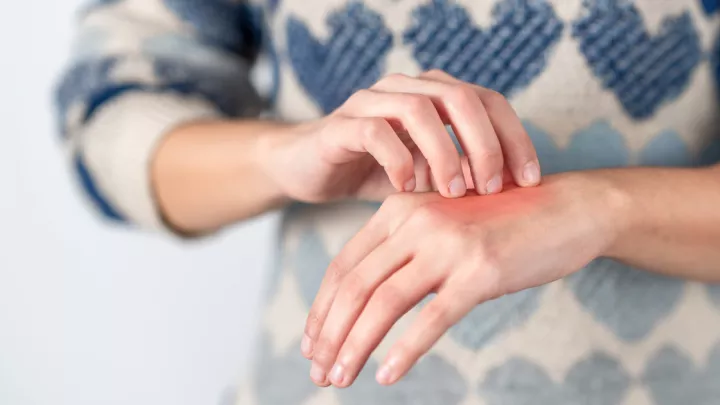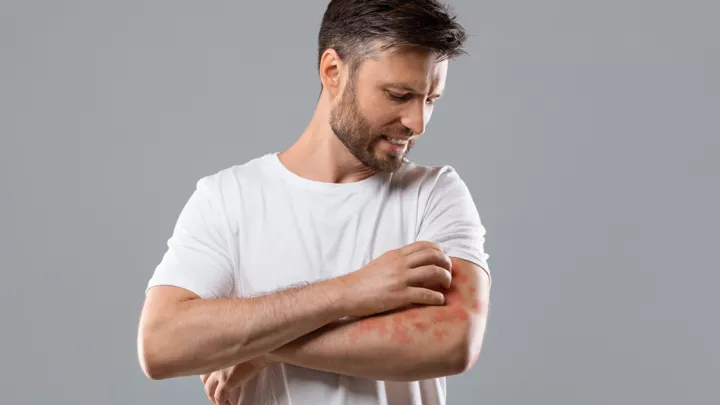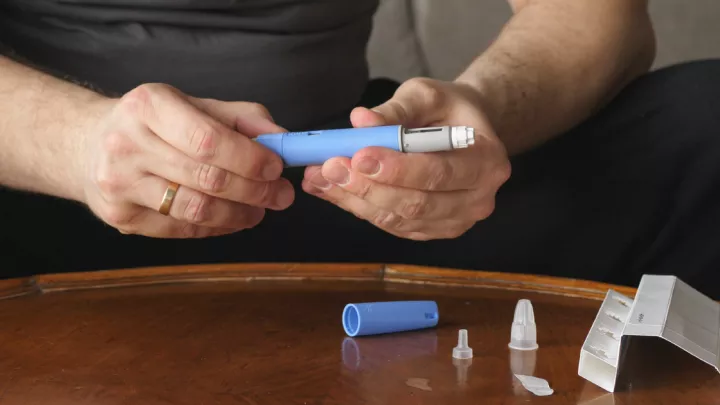How do I know if I have psoriasis?

Psoriasis is a chronic skin condition that affects up to 3% of the population. It is characterized by a thick, scaly rash that typically itches and can sometimes be painful.
“Psoriasis is an immune-mediated disorder that results in inflammation and hyperproliferation (thickening) of the skin” says Sarah Lonowski, MD, MBA, Nebraska Medicine dermatologist. “Psoriasis is typically a chronic condition, but can be characterized by periods of flares and periods of inactivity.”
Psoriasis is not the same as eczema. Eczema is associated with dry, sensitive skin that causes intense itching. It tends to affect different parts of the body than psoriasis, though there can be overlap. Eczema often begins in babies or young children and may improve with age.
Psoriasis most commonly develops in individuals 30 to 60 years old. Both a genetic predisposition and environmental triggers are thought to be important in triggering the condition.
Environmental triggers for psoriasis include:
- Certain medications
- Infections such as strep throat
- Stress
- Cold, dry weather conditions
- Smoking
- Sudden withdrawal of oral or injected steroids
While psoriasis and eczema have similar symptoms, there are ways to tell them apart. Both are associated with patches of red, inflamed, scaly skin. However, the distribution of psoriasis on the body is typically different than that of eczema, and the plaques of psoriasis are typically thicker and more well defined than those of eczema.
Psoriasis can commonly involve the elbows, knees, scalp, lower back, palms of the hands and soles of the feet. Eczema usually appears on parts of your body that bend, such as the inner elbow, behind the knees and neck.
“Unfortunately, there is no cure for psoriasis, but we do have many new and highly effective medications to treat and control the condition,” says Dr. Lonowski.
When to seek medical advice
“The severity and frequency of psoriasis flare-ups can vary greatly for each individual,” says Dr. Lonowski. “If your condition is not severe or bothersome, you may choose not to seek medical treatment. However, symptoms such as itching, pain and flaking often lead people to seek treatment.”
Medical conditions associated with psoriasis
Psoriasis is increasingly being viewed as an inflammatory condition of the entire body, rather than just of the skin, notes Dr. Lonowski. Psoriasis has been associated with “metabolic syndrome,” which includes conditions such as heart disease and diabetes.
Even if the skin condition is not bothersome, your primary care doctor should evaluate and monitor you for these other potential health issues, notes Dr. Lonowski. Some people with psoriasis also develop psoriatic arthritis, which causes joint pain. Dr. Lonowski is part of a multidisciplinary clinic that focuses specifically on psoriasis and psoriatic arthritis to help patients better manage these conditions.
Treatments for psoriasis
A variety of treatments are now available for psoriasis that have fewer side effects than traditional treatments and are very effective, says Dr. Lonowski. These newer immune-mediating therapies target and suppress the components of the immune system that are producing the overactive immune response. This, in turn, decreases inflammation and subsequent itching and rash.
Treatments for psoriasis include:
- Creams and ointments
- Oral medications
- Injectable medications called biologics
- Infused (IV) medications
“Your treatment regimen depends on the severity of your symptoms, areas and percentage of the body affected, your level of discomfort, as well as other factors,” says Dr. Lonowski.
Maintaining a healthy lifestyle can also help you better manage the disease. This includes healthy lifestyle habits such as:
- Abstain from smoking
- Eat a healthy diet, specifically following a Mediterranean diet
- Exercise regularly
- Maintain a healthy body weight
- Reduce stress
“If you have significant itching and rash that won’t go away, remember you don’t have to live with it,” says Dr. Lonowski. “We have many effective treatments that can alleviate the symptoms of psoriasis and other chronic skin conditions.”
A psoriasis clinic is available with Dr. Lonowski at the Westroads Clinic. A multidisciplinary clinic for psoriasis and psoriatic arthritis patients is scheduled once a month with Dr. Lonowski and rheumatologist Brent Leudders, MD. Call 402.559.7928 to make an appointment.







